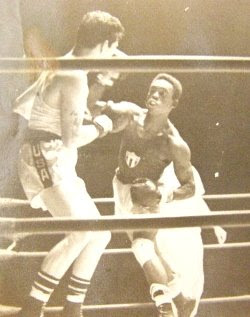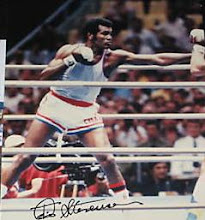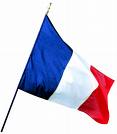If the first Cuban boxing idol has emerged in 1972 with Teofilo Stevenson and if the first Olympic gold medal is received in 1972, the Cuban amateur boxing has grown since the beginning of the revolution and the arrival of Fidel Castro, in 1959.
In this article, we will examine the beginnings of the Cuban amateur boxing and its initial results at the international level. These results will be compared to those of the USA, natural regional rival of Cuba, both in sport and in politic.
1960 : Olympic Games in Rome
The first Cuban boxer to participate at the Olympic Games is Esteban Leiva Aguilera, born in 1941. He's 18 years old, weighs 169 cm for 60 kg. He fights in the lightweights and loses on points 0-5, against O'Brien/Ireland. There were only 12 Cuban athletes at this Olympiad.
Esteban Aguilera Leiva has come alone to these games, without a partner and has trained with athletes from other disciplines.
Teams results : USA are second, USSR fourth and Cuba is not classified.

Cuba stamps for the 1960 OG
Professional boxing :
The Cuban revolution takes place 18 months before the Olympics in Rome. Professional boxing is still allowed at that time. We note for example that the last national professional middleweights title is awarded in 1961.
The pro boxing, as pro sports in general, is banned in February 1962 by a national decree.
While many professional boxers and coaches then left the island to fight abroad (Jose Napoles and Sugar Ramos, for example), new boxers reinforce the amateur contingent, without the danger to become professional thereafter, except defections.
Sport is therefore managed by the Instituto Nacional de Deportes, Educacion Fisica y Recreación, the INDER.
1962 : Central American and Caribbean Games in Kingston/Jamaica
Felix Betancourt, Moises Vives, Osvaldo River and Leonardo Alcolea win the gold medal in their weight division and Roberto Caminero the silver medal. This is a significant achievement for the Cuban amateur boxing.

Roberto Caminero (right)
First participation of Cuba in the boxing tournament of the Pan Am Games.
Roberto Caminero wins the gold medal in the lightweights. Leonardo Alcolea wins the silver medal in the middleweights.
Teams results : Cuba finishes 4th, behind Brazil, USA and Argentina.
Arrival of Alcides Sagarra :
In early 1964, Alcides Sagarra becomes national coach. He is assisted by, among others, Andrei Chervonenko, a coach from USSR. This cooperation brings to Cuba the most developed training techniques of the time.
Various infrastructures are in place to improve the capacity of Cuban athletes to reach the highest level. This is the Escuela Superior del Perfeccionamiento Atletico (ESPA) at the national level and the Escuelas de Iniciacion Deportiva at the regional level.
1964 : Olympic Games in Tokyo
Fermin Espinosa, for the bantams, wins the first fight won by Cuba in the history of the Olympic Games, defeating the Australian William Boot by RSC in the 3rd. The Cuban will not fight against South Korean Cho Chung Kim, due to an hand injury (Walk-over). Espinosa will also fights in the 1968 OG.
Felix Betancourt, light-welter, must beat the Tunisian Habit Galhia in the quarter-finals, to get a medal, but he is wounded in the first round and must left (ko1).
Roberto Caminero, in the feathers, Bienvenido Hita, in the lights, Virgilio Jimenez, in the welters, Rafael Carbonell, in the flyweights, lose before the semi-finals. Carbonell will also fight at the 1968 and 1972 OG.

Rafael Carbonell (left) against Sean McCafferty Ireland
Teams results : USSR is first and USA fourth. There was no direct confrontation between Cuban boxers and those of the USSR and the USA.
Cuba, for 9 fights, has won 3 and has lost 6, a 33 % wins ratio.
1965 : Poland and Cuba
Poland wins 4 fights and Cuba 6 battles in the first match. Poland wins 6 fights, including 3 Walk-over and Cuba 4 battles in the second match.
1966 : Central American and Caribbean Games in Puerto Rico
Andres Molina Casanola, Marinco, Fermin Espinoza, Calcedo and heavyweight Jose Luis Cabrera win the gold medal in their categories. Roberto Caminero wins the silver medal.
1967 : Pan American Games in Winnipeg/Canada
Enrique Regueiferos wins the gold medal for the lightweights, as Andres Molina for the welters.
Rolando Garbey wins the gold medal, in the light-middleweights, in front of Victor Galindez/Argentina, who will become world champion in the pro light-heavyweights.
Jose Cabrera, heavyweight, wins the silver medal, losing in the finals in front of Forest Ward/USA.
Fermin Espinosa wins the silver medal in the bantams, and Joaquim Delis the bronze for the middleweight division.
Teams results : For its second participation at the Pan Am Games, Cuba finishes 1st in the boxing tournament, ahead of the USA. In direct confrontation with the USA, Cuba wins two fights and lost two battles. This demonstrates the progress of the Cuban boxing, facing its American rival.
1968 : Cuba - Bulgaria and Cuba - East Germany
Cuba wins 8 fights and loses 2 battles, facing Bulgaria. Cuba wins 8 fights and loses 3 battles, facing East Germany.
1968 : Olympic Games in Mexico
Enrique Regueiferos Blanco, in the light-welters, wins the first silver medal for Cuba. He loses in the finals against Kulej/Poland by 3-2. Regueiferos is a southpaw and will also fight at the 1972 Olympic Games. An video of a Regueiferos fight, from 1974: http://fr.youtube.com/watch?v=pVcZj5HfnBE
Rolando Garbey fights in the light-middleweights (- 71kg) and loses in the finals against Boris Lagutin/USSR, on points by 0-5. He wins the silver medal and will also fight at the 1972 and 1976 OG. Two videos of his fight : http://fr.youtube.com/watch?v=k9qxjkS9p5w and http://fr.youtube.com/watch?v=Zs0A81Lhnhs

Rolando Garbey (left) with a beautiful guard
Among the others boxers, Rafael Carbonell/Cuba light-flyweight, Roberto Caminero, lightweight, Andres Molina, welter, Fermin Espinosa, bantam, and Orlando Martinez in -54 kg, lose before the semi-finals.
Molina will participate at the 1972 OG, and Martinez at the 1972 and 1976 OG.
Carrillo Nancio Quesada, heavyweight of 2 meters and 85 kg, 18 years old, loses against Bernd Anders/East Germany, by RSC in the 1st round. Teofilo Stevenson will beat Carrillo in 1970, by ko.
Teams results : USSR is first, United States second and Cuba eighth. In direct confrontation with the USSR, Cuba wins one fight and loses two battles. With the USA, Cuba wins two fights and loses one battle.
Cuba, for 22 fights, has won 11 and lost 11 also, a 50 % wins ratio.
1970 : 11th Central American and Caribbean Games in Panama
Oduardo Francisco, Enrique Regueiferos, Rolando Garbey, Luis Valier and heavyweight Jose Luis Cabrera win the gold medal in their division. Marcos Santana and Marcelino Buider win the silver medals.
1970 : 1st Central American and Caribbean Championships in Havana
Cuba win nine gold medals (including Carbonell, Regueiferos and Betancourt) and one silver medal. Teofilo Stevenson beats Earl McClear/Bermuda in the finals.
1971 : Pan American Games in Cali/Columbia
Rafael Carbonnell wins the gold in the light-flyweights, Enrique Regueiferos in the light-welters, Rolando Garbey in the light-middleweights and Emilio Correa in the welters. Emilio Correa will participate at the 1972 and 1976 OG.

Enrique Regueiferos (right)
Manuel Torre wins the bronze in the feathers, as Teofilo Stevenson, who loses his semi-final against Duane Bobick/USA and wins the bronze medal (see his article in this blog).
Teams results : Cuba is the first team, ahead of Mexico and the USA. We do not have the results of direct confrontation between Cuba and the USA.
Conclusions :
At the 1972 Olympic Games in Munich, Cuba will become the most powerful amateur boxing nation of the world. It took nearly 10 years after the Cuban revolution to catch up with a new generation of boxers.
Since then, Cuba remains the best team in the amateur boxing world, keeping the same champions for many Olympiads and having a pool of young prospects. This is obviously not the case for the United States, which see their amateur champions becoming professional after their first Olympiad.


The American tradition in boxing is much known all across because the country has bagged some really great medals in prestigious matches. However, those who love boxing are concerned that the USA has gone a little backward in it. At any cost, America has to emerge out.
RépondreSupprimerPay to Write Essay